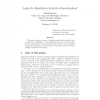Free Online Productivity Tools
i2Speak
i2Symbol
i2OCR
iTex2Img
iWeb2Print
iWeb2Shot
i2Type
iPdf2Split
iPdf2Merge
i2Bopomofo
i2Arabic
i2Style
i2Image
i2PDF
iLatex2Rtf
Sci2ools
189
click to vote
SLOGICA
2011
2011
Logics for Qualitative Inductive Generalization
The paper contains a survey of (mainly unpublished) adaptive logics of inductive generalization. These defeasible logics are precise formulations of certain methods. Some attention is also paid to ways of handling background knowledge, introducing mere conjectures, and the research guiding capabilities of the logics. 1 Aim of this paper This paper describes a variety of adaptive logics of inductive generalization. By a logic I obviously mean a mapping L: ℘(W) → ℘(W), in which W is the set of closed formulas of the standard predicative language L. There is a further requirement for L to be a logic: the selection of CnL(Γ) must be justified by logical means. Moreover, if the logic is to be a formal one, CnL(Γ) must be selected in view of Γ by a formal criterion. The logics are not a contribution to the tradition of Carnapian inductive logic—see for example [14, Ch. 4]. They are logics of inductive generalization in the most straightforward sense of the term, logics that from...
Related Content
| Added | 15 May 2011 |
| Updated | 15 May 2011 |
| Type | Journal |
| Year | 2011 |
| Where | SLOGICA |
| Authors | Diderik Batens |
Comments (0)

